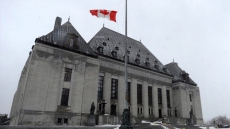OTTAWA — A consumer advocacy group says communications services are so essential to Canadians, some people are willing to give up on food and health care purchases to make sure they stay connected.
And because cellphone, Internet and other services have become a vital part of everyday life, the Public Interest Advocacy Centre is calling on the federal government to make access to affordable communications the law of the land.
In a report released Monday, the group recommends Ottawa adopt an enforceable, universal service obligation, incorporated into legislation including the Telecommunications Act.
The report notes average monthly communications expenses in Canada range from just over $100 to $212.
And for many low-income Canadians, those costs have forced them to rack up substantial debts to maintain service, with some people choosing to forego essentials such as food to pay their phone, cable and Internet bills.
Communications expenses ate up an average of 7.67 per cent of the monthly income of low-income households, with smaller families of between one to four people spending proportionately more.
Despite the costs, many consumers told the group they were reluctant to cancel their communications services, even under tight household budgets.
"Those who were not willing to further reduce or cancel their communications services said that money would have to come from other expenses, such as occasional cinema movie trips for children, holiday and Christmas gifts, smoking, and any personal spending for the adults," said the report, entitled No Consumer Left Behind: A Canadian Affordability Framework for Communications Services in a Digital Age.
"Some consumers were even willing to cut other basic expenses, including food, clothing and health care, rather than cancel their communications services."
The report also recommended that the government introduce affordability guidelines, with average communications costs ranging from four to six per cent of a household’s income.
Affordability, however, is subjective and depends on an individual or household's ability to control their expenses, said the report's authors, who gathered their findings from focus groups, regulators and academic researchers.
Participants were asked to rank the importance of each communication service.
Telephone service, whether corded or wireless, was ranked almost unanimously as the most important.
"Although this was partly because mobile phones especially allowed consumers to carry out a variety of activities, it was above all because telephones kept consumers in contact with the rest of society — family and friends, but also doctors, social workers, employers, clients and service providers," said the report.
Most people who had home Internet service also said they would be extremely reluctant to cancel the service, with many saying they use the Internet to carry out many day-to-day activities such as banking and searching for information.
Television service was considered essential by some low-income groups, including consumers who were less mobile.
The report also recommends that the Canadian Radio-television and Telecommunications Commission provide the public with annual research reports on the affordability of all major communications services to Canadians.





